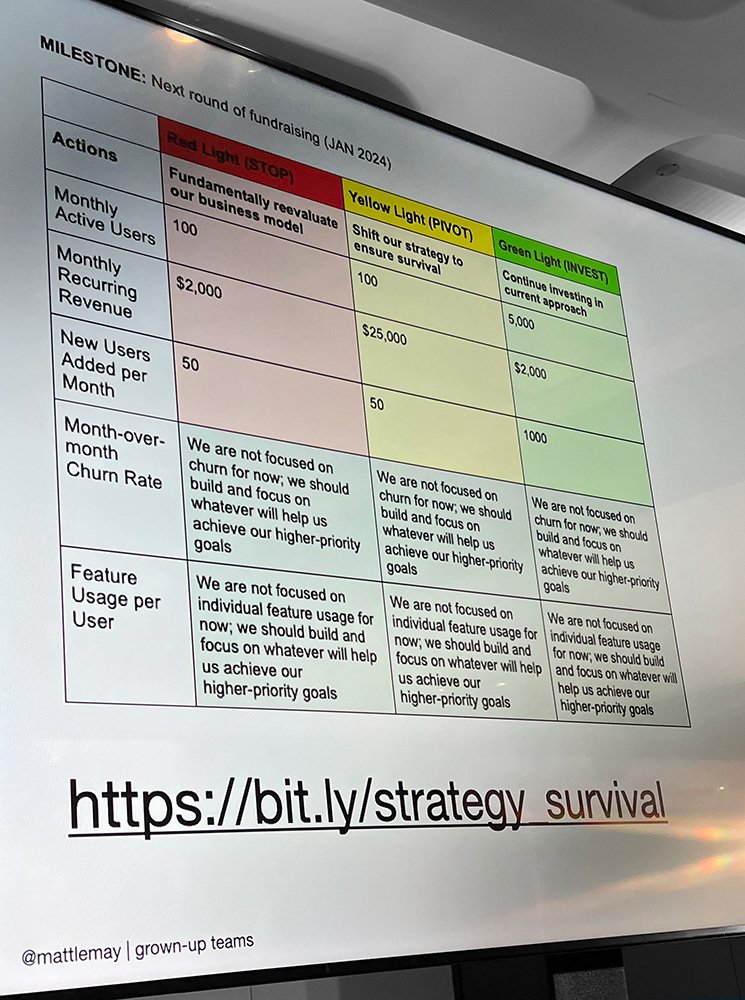Highlights from the MTP Leadership Forum
Great news for the product leadership community in London: Mind The Product’s Leadership Forum was back this October (and better than ever)!
This is one of my favourite events, and one that I believe is so needed by this community. Being the senior leader of a function is often a lonely job, but attending MTP Leadership Forum provides an opportunity to connect with peers and share our most pressing challenges.
The event’s MC Adam Thomas did a great job of framing the day, reminding us that we were likely to end up with more questions than answers and to treat this as an opportunity to learn from each other.
One of Adam’s opening remarks that really resonated with me was that there’s no single silver bullet or one-size-fits-all playbook that will work for everyone. We’re all figuring this out in real-time as our organisations struggle to support product along with other “new” practices like design or data science. But having the opportunity to openly share our challenges in a supportive setting helps us feel less alone and ponder different perspectives for potential solutions.
Tips for Cross-Functional Collaboration
Georgie Smallwood, Chief Product and Technology Officer at Moonpig Group, shared tips for improving cross-functional collaboration. For many organisations, this can be a bit of a mess, but it’s worth solving because better collaboration boosts innovation, improves efficiency, and
enhances the user experience.
You can’t have collaboration without clear communication. And Georgie shared a few practical tips for better communication, including:
Develop awareness of cultural differences in communication. If you haven’t already, make sure you read Erin Meyer’s book, The Culture Map.
Simplify your language whenever possible.
Learn the language of your cross-disciplinary peers so you can speak in terms they care about.
Show examples whenever possible to clarify your points.
Don’t be afraid to ask for help. We often get tripped up at the prospect of asking for help because we worry about bothering others, yet we’d be happy to step in and help them if asked.
How to Lead Grown-up Product Teams
Matt LeMay presenting at Mind The Product Leadership Forum, London, 19 Oct 23
Product leader, author, and consultant Matt LeMay presented a much-needed session on how to lead grown-up product teams.
One of the biggest takeaways? “A grown-up product leader keeps the team grounded in the reality of the business and the market,” says Matt. Leading a grown-up product team means being honest and direct about the financial and existential health of your business. What does your business need to survive and thrive? Make sure you’re communicating this in a specific and realistic manner with your team.
Matt also stressed the importance of being clear with the team about what is expected of them and why and committing to making tough decisions together. While your job is to keep your team aware of the business, their primary focus should be on your users: “The team should feel the urgent need to ground itself in the needs and goals of the user, and to prioritise the most important research activities,” said Matt. That means the team commits to specific outcomes and is accountable for progress on discovering and delivering work that best helps the company achieve its goals. By the way, if you need any guidance on this, Matt shared Adam Thomas’s Survival Metrics, a simple but extremely useful framework.
Matt LeMay shared a framework for startup survival metrics
Finally, to bring it all together, it’s critical to measure progress against your high-level goals and make decisions with and for your team accordingly. While immature product leaders prioritise being liked over doing the right thing, mature leaders of grown-up teams prioritise the work that will be most impactful to the business and its users, not the work people really want to do.
A Few Other Highlights and Thoughts to Share
Adam Warburton, Chief Product Officer at Vypr, offered tips on how to connect vision to action. I loved Adam’s perspective on how to translate vision into goals, strategy, and the day-to-day work of each team. Check out his comprehensive model!
And over at the main conference, Tim Harford, a behavioural economist and columnist at The Financial Times reminded us that we can’t change the world without organisational change. As Louron Pratt wrote in the Mind the Product blog recap, “organisational change is necessary to unlock the maximum capacity of advances.” This point especially resonated with me since I’m no stranger to the hard work that goes into transformation.
I can’t stress enough the importance of taking time to attend events like the MTP Leadership Forum to connect with your community. They help you realise you’re not alone in your problems and give you ideas and inspiration.
But I also know it can be a challenge to know how to apply what you’ve learned. If you’ve ever struggled to figure out your next steps after attending an event like MTP Leadership Forum or you’re looking for more ongoing support throughout the year, you may want to consider one-on-one coaching. A coach can help ensure that you have a path forward to experiment with all the ideas you’ve gathered and reduce some of that loneliness that leaders often experience. I share a bit more about what that process is like and what you can expect from working with me here.



